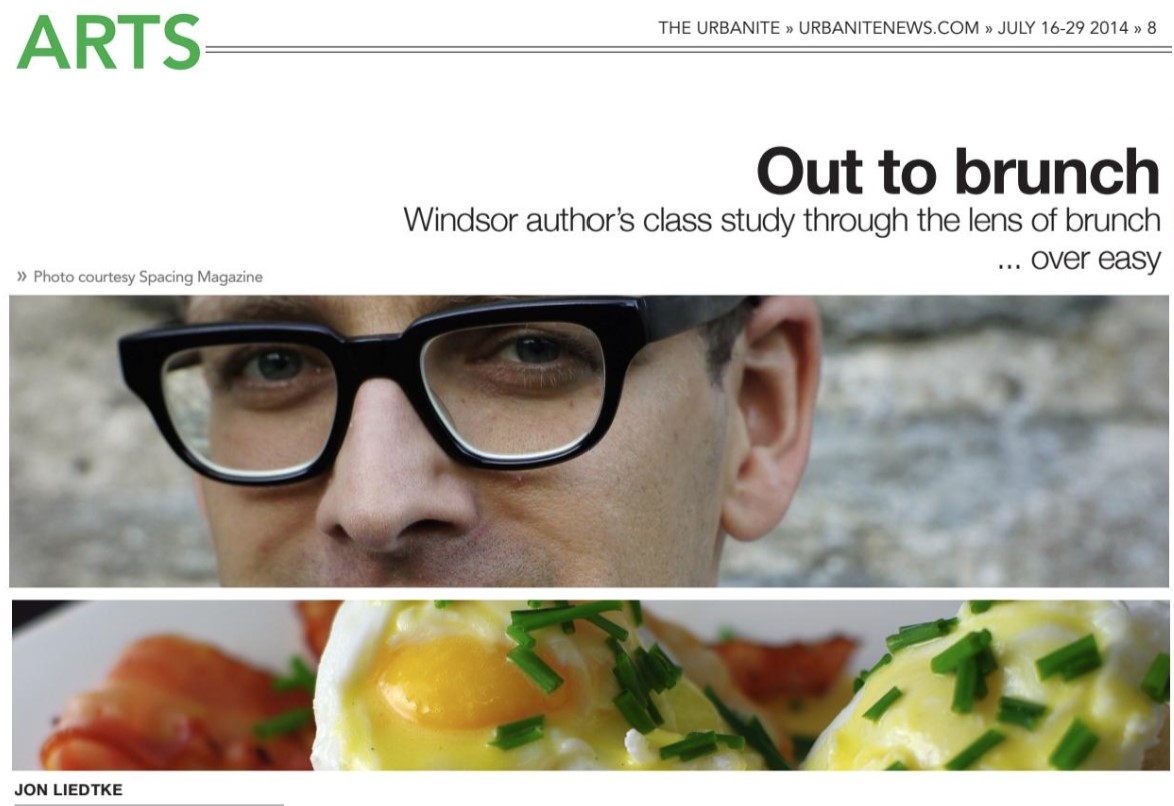The Urbanite – Jon Liedtke – July 16, 2014
You might not think of brunch as a lens to study class issues, but author and urbanist Shawn Micallef found after moving to Toronto from Windsor 14 years ago that it was the perfect way to delve into the subject for his new book The Trouble with Brunch.
“The book was actually incredibly hard to write, it’s not that long, it’s a rather short book, but it’s the hardest thing I’ve had to write,” explained Micallef. “Because class is so ephemeral … writing the book was very much a process of exploring class and trying to explain it to myself because it was something that I found very hard to articulate.”
After relocating, Micallef found that brunch. was handled very differently in Toronto and that it primarily served as a social function, rather than strictly for consumption. He disliked the meal and identified many downsides, primarily, time consumption, cost, cost versus benefit and realized it wasn’t really enjoyable but that everyone kept doing it.
Brunching is primarily enjoyed by the middle class, according to Micallef, and “despite the people… complaining about how the lines seem endless and complaints about portion sizes… there’s still this compulsion to go to brunch.”
“It does have this, I don’t know, religious fervour about it, this unexplainable fate in what has now sort of become a tradition…it has religious overtones in the way people adhere to it almost uncritically.”
Brunch has become a status symbol in Micallef’s eyes and he believes that “if the Joneses are at brunch” that brunch itself becomes “a big part of how we construct our own idea of class and what class we are a part of… if they’re [peers] all brunching, you too will brunch.”
Micallef noticed coming from Windsor- a city with a class strata primarily comprised of the middle class due to the automobile industry and high paying union jobs – that he didn’t notice class like he does now in Toronto.
“The social mixing that happens in Wind- sor, that doesn’t happen in Toronto. People kind of live in their own world, and I think this replicates in other kind of big cities that I’ve been to.”
Micallef’s fondest memories of brunch are from when he was in Windsor and attended places like the Hilton, Fogolar Furlan or the Croatian Club. “It was nothing fancy but it was kind of fancy, the food was kind of standard breakfast food with a couple of lunch things and it was served in a kind of assembly line fashion with somebody carving roast beef at the end… it was very fast and quick and you sat around big tables, there were plenty of washrooms and it was very efficient, and I kind of liked that brunch.”
“Then you come to kind of a cute and almost precious brunches of the big city and its crowded and tiny little tables and chairs, and it’s uncomfortable. It was pretty quick going to Toronto brunches deciding that it was a largely unpleasant experience.”
The difference in class stratas between the two cities caused Micallef to realize that in Windsor, a city where “the bottom could almost drop out at any time”, that people knew “the end was really close” and this gave Windsorites “a resilient way of thinking. Life goes on, you buy houses, go on trips and vacations, but you’re always aware and preparing yourself for that [bottom falling out].”
“Whereas Toronto has kind of a dynamic turning economy that’s busy and people tend to overlook those fault lines and the cracks in their economic foundations and the precariousness of unemployment when it creeps in and it kind of takes people by surprise. I got a sense here that there wasn’t the kind of resiliency that a place like Windsor breeds.”
Windsor is both the star and dedication of the book and Micallef hopes that people who read it and aren’t from Windsor “approach things a little like Windsorites do, which I hope rings true for a Windsorite who reads the book as well.”
The Trouble with Brunch: Work, Class and the Pursuit of Leisure is available now from Coach House Books.
JON LIEDTKE – July 16, 2014
Page 8

Jonathon Liedtke is the managing editor of The Urbanite, Windsor’s alternative newspaper. He is also a member of Windsor’s “Punk with Horns” band The Nefidovs, and as such, is committed to enhancing and sustaining the arts community.



Leave a Reply